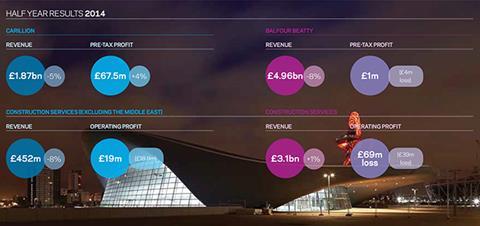Analysts say Balfour has missed an opportunity after rejecting Carillion’s £2.1bn revised offer for a merger

Balfour Beatty has been warned it has missed an opportunity after it rejected a sweetened merger offer from Carillion this week, prompting Carillion to call an end to its pursuit of its contracting rival.
Carillion had been courting Balfour Beatty since May, but the talks broke down after Carillion announced at the end of July that it wanted to keep Balfour Beatty’s consulting arm Parsons Brinckerhoff - which Balfour is currently selling - as part of any merged firm.
This week Carillion offered Balfour shareholders a 58.268% stake in the combined firm, an increase from its offer of 56.5% earlier this month.
Carillion also offered to pay Balfour’s shareholders £59m in cash, equivalent to 8.5p per share.
Carillion said its offer - the third it has made - valued Balfour Beatty at £2.086bn, compared to the £1.886bn it was valued at under its original offer, and well above Balfour’s current market capitalisation of around £1.75bn.
The £200m uplift in valuation was designed to counter the Balfour Beatty board’s pledge to return “up to £200m of capital” to Balfour’s shareholders from the sale of Parsons Brinckerhoff.
But Balfour Beatty rejected the offer on Wednesday (20 August), saying the proposed business plan contained “considerable risk” and the Parsons sale was “reaching successful conclusion”.
It added that Carillion’s offer was “only a small value change” compared to the proposal from Carillion rejected on 11 August 2014 and disputed Carillion’s method for valuing Balfour Beatty.
Balfour said it calculated that Carillion’s offer valued the firm at £1.87bn, a £55m increase from the previous bid.
Balfour Beatty’s rejection of the offer prompted Carillion to call a halt to its pursuit, with Carillion now prohibited, under UK takeover rules, from making a fresh offer for Balfour Beatty within the next six months, unless Balfour Beatty’s board asks it to or a second bidder makes a firm offer for Balfour Beatty.
Stephen Rawlinson, analyst at Whitman Howard, said Balfour Beatty’s rejection of the offer was an “opportunity missed”. “The share price will no doubt reflect that over the coming months,” he said.
Andrew Gibb, analyst at Investec, said Carillion’s offer this week represented “a healthy premium to where Balfour Beatty has been trading”.
He added: “[The Balfour Beatty] board clearly think that they are able to deliver over and above that. The shareholders will hold them to that and if they don’t deliver there will be questions asked about them and their decision-making capabilities.”
But the chief executive of a rival contractor, who preferred not to be named, said while much of the focus had been on how the proposed merger would have benefitted Balfour Beatty, Carillion had more to gain from a deal.
He said: “It is popular to paint Carillion as the strong one and Balfour Beatty as the weak one.
“But if you look at the huge expertise Balfour Beatty has, and the financial position it would be in after selling Parsons Brinckerhoff, then it looks like Carillion has a lot more to gain from this merger.”
Last week both firms issued results for the first six months of the year, with Carillion posting a stable performance, while Balfour Beatty’s problems with its construction business continued (see graphic).
Balfour Beatty - Carillion: the analysts’ reaction
Stephen Rawlinson, analyst at Whitman Howard
Rawlinson said Balfour Beatty’s rejection was a “missed opportunity”. However, he said the process may “galvanise the management at Balfour Beatty to make changes that were not possible before, though to date the solutions we have heard to improving operations are not as radical as might be needed”.
Andrew Gibb, analyst at Investec
Gibb said Carillion’s third offer was “the last throw of the dice”. But he said he still expected Balfour Beatty to do some sort of merger or sale in the near future. “This is a business being dressed up for the shop window,” he said. “The board of Balfour Beatty are keen to dispose of Parsons Brinckerhoff and put a new valuation up for the investment portfolio to tempt in other bidders because the job in hand to turn around the UK construction business is significant and there will be further bumps in the road.”
Andy Brown, analyst at N+1 Singer
Brown said the end of merger talks was most damaging for Balfour Beatty. “Obviously it’s a blow to Balfour Beatty because it’s back to them to deliver plan B or C or whatever iteration we’re on,” he said. However, he added it did raise questions over whether Carillion’s move was “purely opportunistic” or whether it wanted to pursue a merger in order to “mask a potential problem” with its business.



























No comments yet